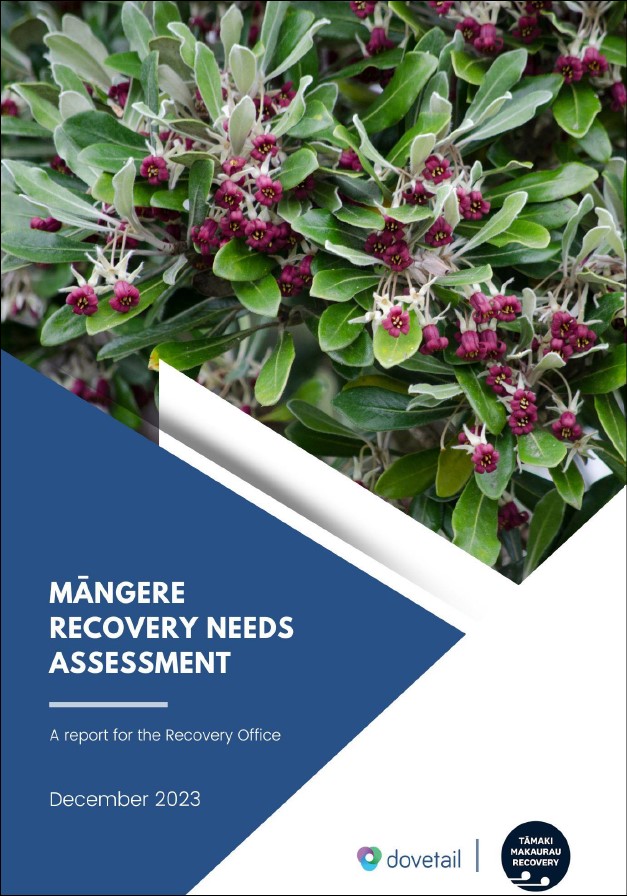Māngere recovery needs assessment
Author:
DovetailSource:
Dovetail, Tāmaki Makaurau Recovery Office, Auckland CouncilPublication date:
2023Topics:
Environment ,PeopleExtract
Executive Summary
Two severe weather events in Tāmaki Makaurau in early 2023 caused widespread damage and displaced thousands of Aucklanders, with many facing ongoing needs stemming from one or both events. The Auckland Council-led Tāmaki Makaurau Recovery Office has undertaken a series of needs assessments to support the development of local recovery plans; this document presents findings from the Māngere/Favona needs assessment.
Community organisations provided a wide range of services in the initial response to the flooding, including the dissemination of food, information sharing, distribution of household goods, welfare checks and relocation of affected residents to temporary accommodation. Since this time, a range of ongoing needs have emerged within the Māngere/Favona community. While primarily linked to the weather events, it was reported that some were evident prior to the flooding and that the nature and extent of these may not be fully known given barriers faced by residents in seeking assistance. Key recovery needs identified included:
- Health and wellbeing needs which were linked to the trauma of the event, anxiety about future adverse weather events, stress and fatigue, and unsuitable accommodation arrangements.
- Housing and accommodation needs which stem from residents being relocated to other Auckland suburbs, a lack of appropriate housing in Māngere/Favona, and flood-damaged homes. This is resulting in overcrowding, increased financial costs, a loss of familial ties and cultural connections, and negative psychological impacts.
- Meeting household basic needs (e.g. paying for rent and petrol) which pose a challenge for some families because of increased financial commitments due to the weather events.
- Insurance-related issues which are leading to increased stress for families, increased costs, and delays in rebuilding damaged properties.
- Infrastructural issues which are linked to stormwater or drainage systems and a need to protect the health of the stream.
- Information and support for residents which is required to address ongoing issues and remove barriers in accessing recovery-related assistance.
Organisations are playing a range of roles in meeting recovery needs, including: connecting residents to service and support options and advocating on their behalf; providing material resources to families still struggling to recover; providing formal counselling services and general pastoral care; preparing residents for future adverse weather events, and offering space or events for the local community to gather and connect.
A range of challenges were identified in undertaking recovery work, including the time-consuming nature of the mahi, the taxing nature of work, ensuring that organisations are not overextended, and resource constraints. Difficulties in engaging the local community were also reported, due to language barriers, a lack of awareness of what is available amongst residents, and a reluctance to reach out for help.
Key facilitators of effective recovery work include a community-led approach, established and trusted relationships between stakeholders (including residents and organisations), a coordinated approach with organisations working together to address needs, and outreach activities such as ‘door knocking’.
Longer term concerns regarding local area risks include a lack of community preparedness for adverse weather events, the capacity of infrastructure to withstand future events, the potential negative impact of housing redevelopments and intensification, and threats to the natural environment. In sustaining recovery within Māngere/Favona, community stakeholders are looking for improved and more frequent communication from Auckland Council, a relational approach with the organisation to deliver services, and increased funding and resourcing for both local providers and residents.
The findings from the needs assessment underscore the value of a coordinated, community-driven strategy that empowers local stakeholders to bridge existing gaps and deliver tailored responses to address the diverse and persistent recovery needs of the Māngere/Favona community.
Dovetail, Tāmaki Makaurau Recovery Office, Auckland Council
December 2023
See also
Wellbeing recovery plan for Tāmaki Makaurau. September 2024
*****
Community and social recovery needs assessment: summary report 2024
Puketāpapa recovery needs assessment 2023
Waitākere Ranges resilience planning 2023
West Auckland emergency response study 2024
West Auckland recovery needs assessment 2023
Knowledge Auckland: Other storm recovery documents
Auckland Council website:
Recovery from extreme weather and natural disasters
